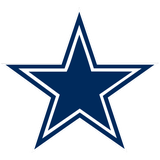
Jones' next stop in journey with Cowboys: Canton

FRISCO, Texas (AP) -- Jerry Jones never seems sure where to start in tracing the roots that led to him becoming one of the most powerful men in the NFL.
His influence in the league is as good a reason as any why the Dallas Cowboys owner and general manager will soon be inducted into the Pro Football Hall of Fame.
Maybe it's the 9-year-old Jones dressed in a bow tie by his mother so he could greet customers at the family grocery store in Arkansas. Or perhaps it's the young Razorback who figured out he could buy game tickets from students for $1 and sell them for $20, which included leaving the locker room to make arrangements for fans.
The most direct link is emerging as the surprise buyer of the proud but fading Dallas franchise for $140 million in 1989. That came a little more than 20 years after a failed bid for the San Diego Chargers, which he tried as a precocious 20-something with almost nothing but borrowed cash.
"These years have been so filled up with special times, even the rough ones, I thought that was my reward," said Jones, who has been on the stage as a presenter three times: for receiver Michael Irvin, running back Emmitt Smith and offensive lineman Larry Allen.
"Even when we've had some serious disappointments there was always, when you looked at a full year, I've never really coveted or really thought about what I'm doing is about ultimately being recognized."
And yet there the 74-year-old Jones will be in Canton, Ohio, on Saturday night, about 20 years after rankling the NFL over revenue issues so much that the league sued him. He sued back.
It's just shy of 25 years since Jones startled the league with the firing of coach Jimmy Johnson after consecutive Super Bowl wins.
Yes, this was the same guy who dumped Tom Landry, the only coach the Cowboys had known in 29 years, when Jones bought the team and hired Johnson, who had no pro experience.
Jones turned on his former Arkansas teammate with the cryptic line for others to hear in early 1994 that the owner could find 500 coaches to lead those talent-laden Cowboys. The bitterness has slowly faded.
"I don't think there's a roller coaster big enough to say how that relationship has evolved," Johnson told The Associated Press. "But I think Jerry and I have always liked one another. We've always had great respect for one another. There's never been any question about our passion or our drive, both of us.
"The main thing is, I'm really happy for Jerry. It's an honor that he really deserves."
Jones' wife, Gene Jones, will present her husband, a nod to Jones' feeling that the Hall of Fame recognition is as much about the family as it is the mark he left in turning the Cowboys into the most valuable brand in sports; Forbes magazine's most recent estimate was $4.2 billion.
A big chunk of that worth comes from Jones' crown jewel, the $1.2 billion showplace that ushered in the era of 10-figure sports stadiums in the United States a decade ago.
Just don't ask son Stephen Jones, the executive vice president of personnel, to pick that or any other facet of Jones' legacy as the reason he's joining a list of contributors that includes the late owner Jones probably looked up to the most: Oakland's Al Davis.
"Only thing I can say is full body of work," Stephen Jones said. "To me, it's five star at all levels. It's at the club level. It's at the NFL level. To me, he checks all the boxes in a double-plus way."
Jerry Jones said he thought his dream of owning an NFL team died with his pursuit of the Chargers. He had made his fortune in the oil business when H.R. "Bum" Bright decided to sell the Cowboys. And there were plenty of people closes to Jones who questioned why he would take over a franchise that he said was losing $100,000 a day.
Within a decade, he had won three Super Bowls, pushed back with owners enough to help get a landmark TV deal that led to huge jumps in rights fees, and won the right to forge his own sponsorship deals.
All the while, his power grew in the small circle of NFL owners, culminating in his vital role a year a half ago in brokering a deal to let the St. Louis Rams move back to Los Angeles -- and get another team there with them. The Chargers moved from San Diego a year later.
"It's coincidental, possibly, that the timing of this Hall of Fame thing is coming along here about the same time that we're where we are with the league," Jones said. "I feel very strongly, what I do with the league is for the Cowboys and I feel strongly that this is going to be better for every team in the league."
Critics point to Jones' failures as a GM, with the Cowboys now at 22 years and counting since their last Super Bowl title. Dallas has won just two playoff games since then.
But there's no dispute about his ability as a businessman translating to influence on the league, or his global star power.
"I really think it's validated his journey, in terms of what he's all about," Stephen Jones said. "He's really stepped out there and had a vision for the NFL that not everybody shared."










